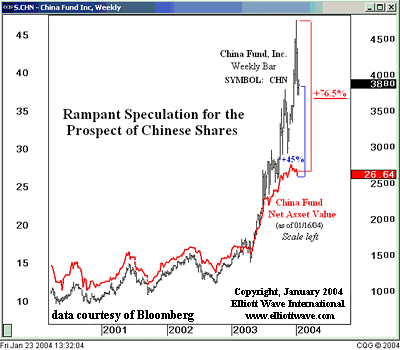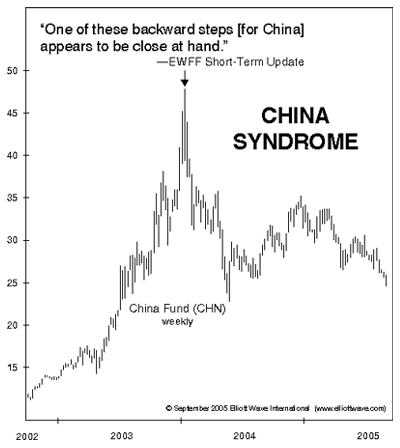Additional References
The Elliott Wave Theorist, December 1998
In China, the government clings to contentions of 4% unemployment and 8% growth, but observers say growth has actually slowed to non-existent and unemployment is probably higher than unofficial World Bank estimates of 8%. Competition is so fierce as deflation takes hold that Beijing is now setting minimum prices for 21 different industries. Despite the measures, prices fell almost 3% in October alone. Angry investors have staged the “boldest protest in the Chinese capital since the 1989 Tiananmen Square demonstrations.” Gitic corporation, the shining financial star behind the office towers, five-star hotels and six-lane highways of Gangzhou and one of the highest fliers of 1997, has been shut down.
The Elliott Wave Financial Forecast, March 2003
Everybody “knows” that China is the future for capitalism. What they have yet to realize is that getting to that future will involve some giant steps backward.
The Elliott Wave Theorist, June 2003
China made a Millennium degree bottom in 1979 with the Cultural Revolution. 35 million people were killed. It has since had a big “wave 1” up and is now in “wave 2” down. Its wave 3 will make it the world power. Buy China at the upcoming low.
The Elliott Wave Theorist, October 2003
China will have a severe economic setback along with the rest of the world, but it will be a “wave 2,” from which the country will emerge as the economic leader of the world.
EWFF Short Term Update, January 5, 2004

One of the other points is that the China Fund (CHN), a closed-end investment company that invests in equity securities that engage in business in China, is now trading at a 76.5% PREMIUM to its net asset value. According to Bloomberg, from January 2000 to January 2, 2004, the China Fund has traded at an average 13% DISCOUNT to its net asset value. The fund went from trading at a discount to trading at a premium in May of last year and the gap between the two has widened ever since. What we find of interest is that the two main Chinese stock exchanges, the Shanghai and the Shenzhen, have each had abysmal performances since their respective highs in 2001 (see chart). Yet this has not stopped investors from ignoring reality and pouring money into the idea of “China,” which many have embraced as the “hot” area for investment. What does this remind you of? Hint: think “Internet.” Our view is that eventually china will indeed be the beneficiary from a tectonic shift in labor and investment capital into the country, as they potentially become the world’s next Superpower. But as we said in the March 2003 issue of The Elliott Wave Financial Forecast, “Everybody ‘knows’ that china is the future for capitalism. What they have yet to realize is that getting to that future will involve some giant steps backward.” One of these backward steps appears to be close at hand.
[note: below is a chart of the China Fund (CHN) updated to the present]

The Elliott Wave Financial Forecast, June 2004
At the Crest of the Tidal Wave called for a collapse that “will sour investors for decades on the now certified-sensible idea of diversified global investing.” In recent weeks, a five-wave drop in various emerging market indexes signals the shift toward the coming view of emerging markets as investments for the certifiably insane.
China, the other emerging engine of world growth, has also quietly turned down. In fact, Short Term Update subscribers are probably among the few that even realize the china Fund has been leading the way down since the first week of January. On January 5, STU noted that the fund was trading for a premium of 76.5% over its net asset value and stated that a big step downward for the china Fund “appears to be close at hand.” The next day it began a decline that has already erased 44% of its value. The move is obviously just starting because the newspapers continue to assign the torch of global “economic powerhouse” to china. As EWFF has noted before, china may be the future, but it has some big issues to work through before it takes up the full mantle of leadership, for example a mountain of bad loans. According to Chinese officials, the ratio of troubled loans held by its banks is 20%, six times the level considered to be dangerous by bank regulators in the U.S. According to S&P, the Chinese estimates are way too low. Independent analysts say more like 50% of loans held by Chinese banks are in arrears!
As EWFF noted last month, the most dangerous aspect of china’s problem is that Chinese leaders have decided to crack down in the financial realm. They’ve issued new land use guidelines, reserve requirements for banks, higher interest rates and restrictions that will “rein in booming industrial growth.” The measures are the equivalent of the Federal Reserve’s decisions to hike interest rates near the great peaks of 1929, 1966 and 2000. Japan did the same thing right after its all-time high in December 1989, raising its discount rate a full point in March 1990 to “let the air out of the bubble slowly.” When the Fed raised interest rates to stem growth in 1999/2000, EWFF said that this policy “will only end up cutting oxygen flow to an economy that will be gasping for air as soon as the market heads down.” That’s exactly what happened. In china, the potential havoc is multiplied by the fact that the market is not the ultimate authority; a committee of avowed communists is. As The Elliott Wave Theorist observed back in 1997, the world stock mania was so enthralling that even communists got caught up in the fever. As long as the trend was up, free markets were easy to accept. Falling markets will bring an endless stream of fixes and reforms and, eventually, full-scale political upheaval. Once the bottom and a new political order are in place, china will be cleared for a real long term take-off. |
